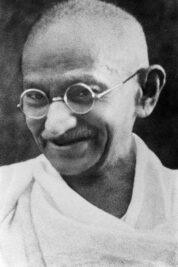Gandhi, Mohandas
Mohandas Gandhi was the preeminent leader of the Indian nationalism in British-ruled India. Employing nonviolent civil disobedience, Gandhi led India to independence and inspired movements for civil rights and freedom across the world. The honorific Mahatma (“high-souled” or “venerable”) is now used worldwide. He is also called Bapu (“father” or “papa”) in India. In common parlance in India he is often called Gandhiji and is unofficially the “Father of the Nation.”
Gandhi first employed nonviolent civil disobedience as an expatriate lawyer in South Africa, in the resident Indian community’s struggle for civil rights. After his return to India in 1915, he set about organizing peasants, farmers, and urban laborers to protest against excessive land-tax and discrimination. Assuming leadership of the Indian National Congress in 1921, Gandhi led nationwide campaigns for easing poverty, expanding women’s rights, building religious and ethnic amity, ending untouchability, but above all for achieving self-rule.
Gandhi famously led Indians in challenging the British-imposed salt tax with the 250 mile Salt March, and later in calling for the British to “quit India.” He was imprisoned often for many years, in both South Africa and India. Gandhi attempted to practice nonviolence and truth in all situations, and advocated that others do the same. He lived modestly in a self-sufficient residential community and wore the traditional hand spun yarn Indian shawl. He ate simple vegetarian food, and also undertook long fasts as a means of both self-purification and social protest.
After India achieved independence, he undertook several fasts to promote religious harmony with the neighboring Muslim but some Indians thought he was too accommodating and he was assassinated on January 30th,1948.
His birthday, October 2, is commemorated as Gandhi Jayanti, a national holiday, and world-wide as the International Day of Nonviolence.

